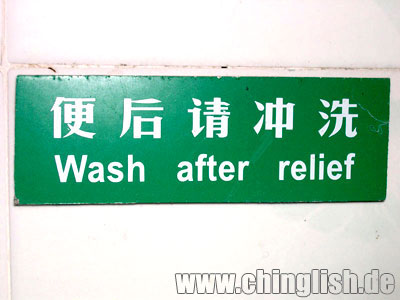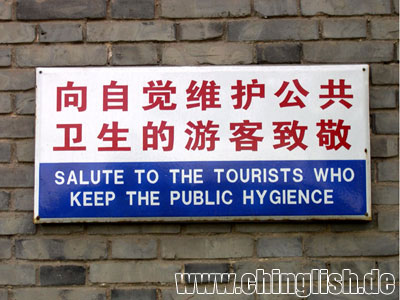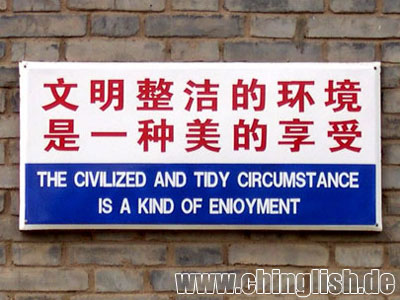As stated in my previous post
The most asked question - why? I hereby present some examples of free online translation software that might help to further support my theory of many Chinglish signs actually being produced by using online services.
I randomly selected some of this collection's catchier phrases and ran translation quests on five different websites (their adresses are found below).
As you can see, the outcome is not only pure Chinglish (as is the case with almost any other language), but
sometimes quite similar to what I have found on public signs around the country (the original translations are shown in brackets). Enjoy.
先下后上,文明乘车(
After first under on, do riding with civility, see
original entry)
(1) After first under on, the civilization rides in a carriage.
(2) Go down upper, civilized riding of queen first.
(3) After descending first up, the civilization goes by car.
(4) After the jump, civilized ride.
(5) Under on, the civilization rides in a carriage after first.
青青的草 怕你的脚(
Green grass dreading your feet, see
original entry)
(1) The blue grass fears your foot.
(2) Green grass is afraid of your foot.
(3) The very green grass fears your feet.
(4) Green grass afraid your legs.
(5) The blue grass fears your foot.
小草有情 你当有意(
Love the litter grass, see
original entry)
(1) The grass feels emotion you when intends.
(2) Small grass has feeling you should have a mind to.
(3) The small grass has feeling you to be to have intention to.
(4) When you intend to large and enthusiastic. (!)
(5) The grass feels emotion you when intends.
注意安全 请勿戏水(
Noticing Security, Don't play water, see
original entry)
(1) Pays attention safely please do not play with water.
(2) Pay attention to safety not play with water please.
(3) Noticing the safety pleases not drama water.
(4) Do not playing in the water safety.
(5) Pays attention safely please do not play with water.
向自觉维护公共卫生的游客致敬(
Salute to the tourists who keep the public hygience, see
original entry)
(1) Salutes to the aware maintenance public health tourist.
(2) Salute to the visitor who defends public health conscientiously.
(3) Pay respects toward the visitor who aware of self to support public hygiene.
(4) Tourists pay tribute to consciously safeguard public health.
(5) Salutes to the aware maintenance public health tourist.
文明参观 讲究卫生(
Visit in civilization, pay attention to hygiene!, see
original entry)
(1) Civilized visit Is fastidious the health.
(2) Civilization is paid a visit to Pay attention to hygiene.
(3) Civilization visit Pay attention to hygiene.
(4) Civilization tour Stress health.
(5) The civilization visits Is fastidious hygienic.
请勿忘随身物品(
Don't forget to carry your thing, see
original entry)
(1) Please do not forget along with the goods.
(2) Do not forget please with self article.
(3) Please don't forget personal luggage.
(4) Do not forget belongings.
(5) Please do not forget along with goods.
And last, but not least:
残疾人厕所(Deformed man toilet, see
blog header)
(1) Disabled person restroom
(2) Deformed man toilet (!)
(3) Disable and sick person's toilet
(4) Disabled toilet
(5) Disabled person restroom
Used online services(1) http://fanyi.cn.yahoo.com/ (same as Altavista's Babelfish?)
(2) http://trans.godict.com/
(3) http://www.iciba.com/
(4) http://translate.google.com/
(5) http://www.onlinetranslation.cn/
Update:I was just informed that tool (2) trans.godict.com has changed its engine to Altavista's translation service some time after this entry.
I tried to post several of the slogans on display above and godict.com didn't show any translations at all (using bits and pieces works fine). It seems they removed all problematic utterances that I've put on here. Interesting, indeed. I keep you updated.
Update 2:A week later trans.godict.com properly uses it's own translations again, resulting in the very special "deformed man toilet". Back to normal, it seems.






